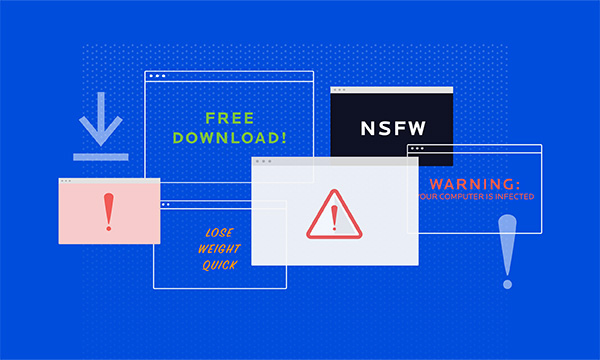WhatTheHack? Adware?
by Chen Xinyi, Leo Qiyi Joel, Kok Wei En Isaac
23 Feb 2019
On this episode 4 of “WhatTheHack?”! We would be talking about Adware!

Ever were you scrolling through your computer and suddenly a random advertisement were to pop out of nowhere? Ever heard of adware? If you do not know .. well you are in luck! Continue to read on this episode of “WhatTheHack?” to learn more about Adware!
So? In the computing world.. what exactly is a Adware?
So firstly …. adware is an unneeded/unwanted software designed to throw advertisments onto your screen(mostly within a web browser)! Users usually download it without even knowing it, and most of the time users would just dimiss these advertisments that pop out of nowhere as part of the website they are going to, but in reality it is the adware at work. Hence, most people would not even think that their computers have been infected by adware.
Adware generates revenue for its developers by displaying advertisments onto your screen (duhhh) although the advertisments could have nothing to do with the website you are visiting! And companies actually pay to have their advertisments be displayed onto your computer screen (while u browse through a random website) through a adware that is installed onto your computer without your permission (really evil…) such that when you unevitably see their advertisment, you may be “motivated” to go and buy it.
Once adware hijacks your device, it might carry out all sorts of unwanted tasks. The software’s functions may be designed to analyze the location and which Internet sites you visit, and then present advertising pertinent to the types of goods or services featured there. While adware is more of a pesky nuisance than a harmful malware threat to your cybersecurity, if the adware authors decide to sell your browsing behavior and information to third parties, they can even use it to target you with more advertisements customized to your viewing habits( oh no .. ). And it doesn’t matter whether you are using Chrome, Firefox, or any other search engines: IT AFFECTS ALL OF THEM!
So what are signs you can look for to see if your computer is infected by an adware?
- Advertisements appear in places they shouldn’t be.
- Your web browser’s homepage has mysteriously changed without your permission.
- Web pages that you typically visit are not displaying properly.
- Website links redirect to sites different from what you expected.
- Your web browser slows to a crawl.
- New toolbars, extensions, or plugins suddenly populate your browser.
- Your computer starts automatically installing unwanted software applications.
- Your browser crashes.
So how are keyloggers spreaded?

- Via Freeware or Shareware (could be discussed about in future episodes SO STAY TUNED!)
You download a program —usually freeware or shareware— and it quietly installs adware without your knowledge, or permission. That’s because the program’s author signed up with the adware vendor. After the adware is installed into your computer, the adware launches its mischief, and the user learns there’s a price to pay for “free.”
- Via infected websites
You’re visiting a website. Maybe it’s a trusted site; maybe it’s a sketchy one. Either way, it can be infected with adware, which takes advantage of a vulnerability in the user’s web browser to deliver a drive-by download. After it burrows in, the adware starts collecting your information, redirecting you to malicious websites, and throwing more advertisements into your browser.
So how can you prevent Keylogger malware/trojan?
-
Use an Adware removal software (aka anti-virus softwares as adwares use technologies that are similar to those used by viruses to penetrate your computer) to remove the adware (although antivirus solutions may not be able to determine whether a specific Adware program poses a threat to you, hence you would most likely need to make the decision yourself on which software you think have an adware and remove it using an antivirus software)
-
Users should be discerning about the types of software they download online, should read end-user license agreements before downloading free software to find out if the software authors will conduct information gathering on their devices.
-
Use certain softwares to scan through the certain document you have downloaded for viruses (adwares) before downloading it. For eg: In Windows Explorer, right-click a file or directory and select Scan.
-
Use a pop-up ad blocker to prevent unexpected windows from opening
-
Should avoid clicking on ads if they are not being displayed on a trusted site.

In conclusion, Adware is a type of software that displays advertisments onto your screen and exist without you probably ever knowing. However, one just has to take the few and simple steps above and Adware can be prevented and all of your data and privacy and eye sores(due to unneeded advertisments) could be saved!
On the next episode of “WhatTheHack?”, we would be exploring on what the hack is a Phishing Email, how it can affect you (if you fall for its trap) and how you can spot it!! SO STAY TUNED FOR MORE HACKING/COMPUTING TERMS AND KNOWLEDGE ON “WhatTheHack?”